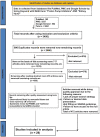Impact of Proton Pump Inhibitors on Kidney Function and Chronic Kidney Disease Progression: A Systematic Review
- PMID: 38174181
- PMCID: PMC10762285
- DOI: 10.7759/cureus.49883
Impact of Proton Pump Inhibitors on Kidney Function and Chronic Kidney Disease Progression: A Systematic Review
Abstract
Proton pump inhibitors (PPIs) are widely prescribed medications for the management of various gastrointestinal disorders, primarily gastroesophageal reflux disease (GERD) and peptic ulcers. However, recent concerns have emerged regarding their potential adverse effects on kidney function and their role in the progression of chronic kidney disease (CKD). This systematic review aims to comprehensively analyze the existing literature to assess the impact of PPI use on kidney function and CKD progression. We took information from PubMed, PubMed Central (PMC), and Google Scholar articles from the last 10 years, from 2013 to 2023, and looked for links between PPI use and a number of kidney-related outcomes. These included acute kidney injury, a drop in the estimated glomerular filtration rate (eGFR), and new cases of CKD. The findings of this systematic review highlight the need for a thorough evaluation of the benefits and risks associated with PPI use, particularly in patients with pre-existing kidney conditions, in order to inform clinical decision-making and improve were taken out and looked at to see if there were any links between PPI use and different kidney-related events, such as acute kidney injury, a drop in the estimated eGFR, and the development of CKD. The review also explores potential mechanisms underlying PPI-induced nephrotoxicity. The findings of this systematic review highlight the need for a thorough evaluation of the benefits and risks associated with PPI use, particularly in patients with pre-existing kidney conditions, in order to inform clinical decision-making and improve patient care. Further research is warranted to better understand the complex interplay between PPIs, kidney function, and CKD progression.
Keywords: chronic kidney disease; kidney function; kidney injury; long-term results; proton pump inhibitors.
Copyright © 2023, Parmar et al.
Conflict of interest statement
The authors have declared that no competing interests exist.
Figures


References
-
- OTC Sales by Category 2014-2017. [ Mar; 2019 ]. 2019. https://www.chpa.org/OTCsCategory.aspx https://www.chpa.org/OTCsCategory.aspx
Publication types
LinkOut - more resources
Full Text Sources
Research Materials
Miscellaneous
